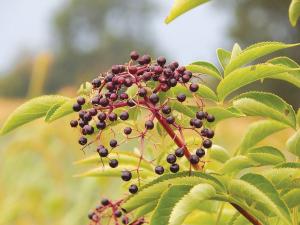Elderberry Syrup Offers Health And Profits
 ✖  |
Elderberries contain vitamins A, B and C and are renowned for their ability to “wake up” the immune system for better protection against illness. Elderberry syrup can also reduce cold and flu symptoms, help clear sinus infections, promote bowel health, and even ease allergy symptoms.
The berries are rarely eaten raw. Instead, they’re processed into a potent syrup that sells for a premium. Elderberry products are a $320 million business worldwide, and it’s not unheard of to find elderberry syrup selling for over $20 for a 4-oz. bottle. Whether you’re interested for yourself or considering it as a cottage industry, making homemade elderberry syrup is rewarding and cost-effective.
Elderberry bushes are native across most of the U.S. and thrive in moist areas along borders between forests and open space. They’re commonly spotted around lakes, ponds, and roadways. The season for fresh berries is usually mid-August through mid-September. It’s also possible to grow the berries in backyard gardens.
It takes less than an hour to create over 30 servings of elderberry syrup. While it’s possible to use fresh or dried berries, the ratio of water will change within the recipe.
Start with two cups fresh or frozen berries or one cup dried and up to four cups water, two cups honey, and 1/4 cup lemon juice, along with your preferred add-ins. Popular options include cinnamon, raw honey, ginger, thyme, cayenne pepper and echinacea root.
Bring the water and berries to a boil, allowing them to simmer for 15 min. Mash the berries to release their juice, and strain the resulting liquid to remove all solid material. Continue simmering until the juice is reduced by half. Take it off the stove and let it cool to room temperature before adding honey and lemon juice, stirring until dissolved.
Store in sealed jars in the fridge or further process by canning. This requires bringing the syrup back to a boil and pouring it into mason jars. Water bath can them for 10 min. When canned, elderberry syrup is shelf-stable and should last a year or longer. Opened jars belong in the refrigerator and can be kept for up to two months.
Only small doses (one teaspoon) of elderberry syrup are needed. Some people take it straight off the spoon, while others mix it into smoothies or drizzle it on baked goods. As elderberry is an immune system supporter, it’s okay to take a daily dose. If you’re dealing with illness, consider upping the dosage to as much as a tablespoon every three hours. Note: Do not serve syrup that contains honey to children under one.
Another method toward profitability with elderberry is to prepare “syrup kits” with dried berries and necessary add-ins, along with instructions. These make excellent gifts and are easier to ship than pre-made syrup.

Click here to download page story appeared in.
Click here to read entire issue
Elderberry Syrup Offers Health And Profits CROPS New Techniques Elderberries contain vitamins A B and C and are renowned for their ability to “wake up” the immune system for better protection against illness Elderberry syrup can also reduce cold and flu symptoms help clear sinus infections promote bowel health and even ease allergy symptoms The berries are rarely eaten raw Instead they’re processed into a potent syrup that sells for a premium Elderberry products are a $320 million business worldwide and it’s not unheard of to find elderberry syrup selling for over $20 for a 4-oz bottle Whether you’re interested for yourself or considering it as a cottage industry making homemade elderberry syrup is rewarding and cost-effective Elderberry bushes are native across most of the U S and thrive in moist areas along borders between forests and open space They’re commonly spotted around lakes ponds and roadways The season for fresh berries is usually mid-August through mid-September It’s also possible to grow the berries in backyard gardens It takes less than an hour to create over 30 servings of elderberry syrup While it’s possible to use fresh or dried berries the ratio of water will change within the recipe Start with two cups fresh or frozen berries or one cup dried and up to four cups water two cups honey and 1/4 cup lemon juice along with your preferred add-ins Popular options include cinnamon raw honey ginger thyme cayenne pepper and echinacea root Bring the water and berries to a boil allowing them to simmer for 15 min Mash the berries to release their juice and strain the resulting liquid to remove all solid material Continue simmering until the juice is reduced by half Take it off the stove and let it cool to room temperature before adding honey and lemon juice stirring until dissolved Store in sealed jars in the fridge or further process by canning This requires bringing the syrup back to a boil and pouring it into mason jars Water bath can them for 10 min When canned elderberry syrup is shelf-stable and should last a year or longer Opened jars belong in the refrigerator and can be kept for up to two months Only small doses one teaspoon of elderberry syrup are needed Some people take it straight off the spoon while others mix it into smoothies or drizzle it on baked goods As elderberry is an immune system supporter it’s okay to take a daily dose If you’re dealing with illness consider upping the dosage to as much as a tablespoon every three hours Note: Do not serve syrup that contains honey to children under one Another method toward profitability with elderberry is to prepare “syrup kits” with dried berries and necessary add-ins along with instructions These make excellent gifts and are easier to ship than pre-made syrup
To read the rest of this story, download this issue below or click
here to register with your account number.







